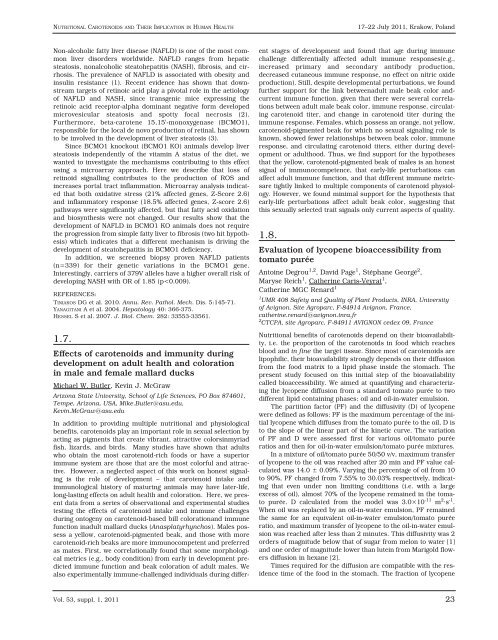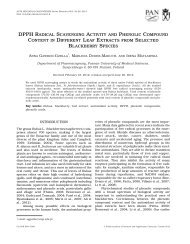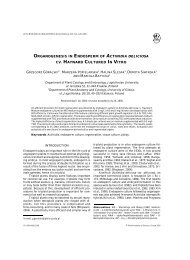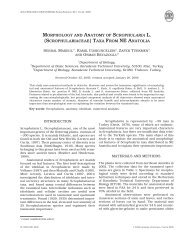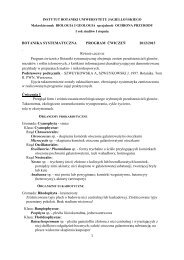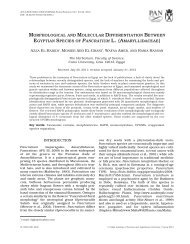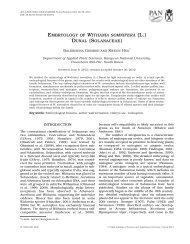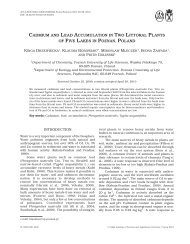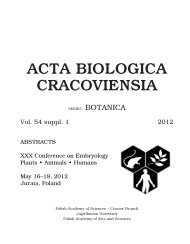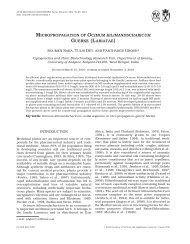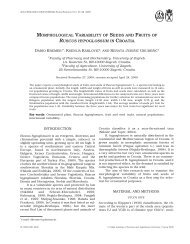16 TH INTERNATIONAL SYMPOSIUM ON CAROTENOIDS addition to the above carotenoids, we monitored the uptake of the epoxycarotenoid conversion products neochrome (from neoxanthin) and luteoxanthin/auroxanthin (from violaxanthin), showing complete epoxide-furanoid conversion under the conditions applied, but also comparable micellarization and cellular uptake with respect to lutein. The present results indicate that divalent ions may inhibit carotenoid micellarization and uptake, warranting further examination in vivo. This study was supported by the Fonds National de la Recherche Luxembourg (PhD Grant TR-PHD-BFR07/142). 1.4. Cardiovascular related biomarkers as affected by consumption of tomato products – results from human intervention studies within LYCOCARD Volker Böhm Institute of Nutrition, Friedrich Schiller University Jena, Dornburger Str. 25-29, 07743 Jena, Germany, Volker.Boehm@uni-jena.de Various epidemiological studies showed prevention of cardiovascular diseases (CVD) by consumption of tomato products, being the main lycopene source in Western diets. Beside this red coloured carotenoid also other ingredients of tomatoes (e.g. ascorbic acid, folic acid, phenolic compounds) may be responsible for beneficial effects. One possible mechanism of prevention is the antioxidant potential of tomatoes and tomato products. Invitro studies as well as animal experiments showed different mechanisms of action of lycopene. However, in-vivo studies are needed to show effects of relevance for human beings. Thus, within the European project LYCOCARD several human intervention trials were done, using different tomato products (tomato purée, tomato passata, tomato juice, tomato ketchup). Looking for primary prevention effects, volunteers were healthy people without or with CVD risk factors (smokers, postmenopausal women, obese people), ingesting between 12 and 46 mg lycopene per day out of tomato products for one week up to 18 months. Although the lycopene contents in plasma significantly increased in all studies, only small changes were observed in CVD relevant parameters. Some volunteers showed significantly increased antioxidant capacity in plasma. In addition, inflammatory markers were decreased after consumption of tomato products. In contrast, endothelial function remained unchanged (Stangl et al., 2011) as did lipid status parameters. Thus, further studies need to investigate more in detail CVD relevant anti-inflammatory effects of tomato ingredients. Concluding all investigations within LYCOCARD, looking for primary prevention proved to be difficult as all volunteers were healthy and the intervention studies with different products were not able to improve the health status. However, these study results do not exclude preventive effects of tomato products, with CVD development often taking decades . To eat tomato products within a mixed diet is always a good and tasty choice, as lycopene is better absorbed from processed products than from raw tomatoes. REFERENCES: STANGL V, KUHN C, HENTSCHEL S, JOCHMANN N, JACOB C, BÖHM V, FRÖHLICH K, MÜLLER L, GERICKE C, LORENZ M. 2011. Lack of effects of tomato products on endothelial function in humans: Results of a randomised, placebo controlled cross-over study. British Journal of Nutrition 105: 263-267. 1.5. Carotenoid exposure of inflammational stimulated Caco-2 intestinal epithelium cells – impact on biomarkers of inflammation and the proteome Anouk Kaulmann, Tommaso Serchi, Jenny Renaut, Sebastien Planchon, Lucien Hoffmann, Torsten Bohn Environmental-and Agro-Biotechnologies Department, Centre de Recherche Public Gabriel Lippmann, 41, rue du Brill, 4422 Belvaux, Luxemburg. kaulmann@lippmann.lu, serchi@lippmann.lu, renaut@lippmann.lu, planchon@lippmann.lu, hoffmann@lippmann.lu, bohn@lippmann.lu Carotenoid dietary intake has been related to a number of health beneficial effects, including the reduction of several chronic diseases such as cancer and cardiovascular complications. This is in part due to their antioxidant potential, albeit they could act via many different pathways that may result in anticancerous or anti-inflammatory properties. However, no data is available on their action on the intestinal epithelium, being exposed to the highest concentrations of carotenoids in the human body, and where they could act in a preventive way on intestinal inflammatory diseases such as Crohn's disease and ulcerative colitis. The objective of the present study was to investigate whether lycopene and β-carotene in micelles, at concentrations that could be reached via the diet (10-25 μg/ml) could aid in the reduction of TNF-α plus IL-1 induced inflammation of human derived Caco-2 epithelium cells. The impact on biomarkers of inflammation, including IL-8, nitric oxide, prostaglandin-2α, and NF-kB and MAPK pathways of intracellular signalling cascades were evaluated vs. a control (empty micelles). Furthermore, proteomic analyses were conducted from total cellular protein extracts following 2 D-DiGE and MALID-TOF/TOF analyses. Results revealed that isolated carotenoids had no statistical significant anti-inflammatory effect on the biomarkers observed, or on the regulation of NF-kB and MAPK. Nevertheless, analyses of the proteome suggested that 15 proteins were significantly (P1.3) differentially regulated following β-carotene exposure, participating mostly in cellular metabolism including antioxidant mechanisms, such as glutathione synthase. Only 1 protein was differentially regulated by lycopene (profilin-1). To our knowledge, this is the first attempt to investigate pathways involved in the action of carotenoids on the intestinal epithelium, including proteomic analyses. 1.6. BCMO1 deficiency induces nonalcoholic steatohepatitis independent of fatty acid oxidation and synthesis SESSION 1 Georg Lietz1 , Christine Bösch-Saadatmandi1 , Lars Eijssen2 , Franck Tourniaire1,3 , Susanne Hessel4 , Jean Francoise Landrier3 , Anthony Oxley1 , John Hesketh1 , Jaume Amengual6 , M. Luisa Bonet5 , Chris Evelo2 , Yvonne G. J. van Helden7 , Jaap Keijer7 , Adrian Wyss8 , Alaistair Burt1 , Matthew Wright1 , Heather Cordell1 , Ann Daly1 , Julian Leathart1 , Chris Day1 , Johannes von Lintig6 1Newcastle University, UK 2University Maastricht, The Netherlands 3Université Aix-Marseille I et II, France 4University of Freiburg, Germany 5Universitat de les Illes Balears, Spain 6Case Western Reserve University, USA 7Wageningen University, The Netherlands 8DSM Nutritional Products, Switzerland 22 <strong>ACTA</strong> <strong>BIOLOGICA</strong> <strong>CRACOVIENSIA</strong> Series Botanica
NUTRITIONAL CAROTENOIDS AND THEIR IMPLICATION IN HUMAN HEALTH Non-alcoholic fatty liver disease (NAFLD) is one of the most common liver disorders worldwide. NAFLD ranges from hepatic steatosis, nonalcoholic steatohepatitis (NASH), fibrosis, and cirrhosis. The prevalence of NAFLD is associated with obesity and insulin resistance (1). Recent evidence has shown that downstream targets of retinoic acid play a pivotal role in the aetiology of NAFLD and NASH, since transgenic mice expressing the retinoic acid receptor-alpha dominant negative form developed microvesicular steatosis and spotty focal necrosis (2). Furthermore, beta-carotene 15,15'-monoxygenase (BCMO1), responsible for the local de novo production of retinal, has shown to be involved in the development of liver steatosis (3). Since BCMO1 knockout (BCMO1 KO) animals develop liver steatosis independently of the vitamin A status of the diet, we wanted to investigate the mechanisms contributing to this effect using a microarray approach. Here we describe that loss of retinoid signalling contributes to the production of ROS and increases portal tract inflammation. Microarray analysis indicated that both oxidative stress (21% affected genes, Z-Score 2.6) and inflammatory response (18.5% affected genes, Z-score 2.6) pathways were significantly affected, but that fatty acid oxidation and biosynthesis were not changed. Our results show that the development of NAFLD in BCMO1 KO animals does not require the progression from simple fatty liver to fibrosis (two hit hypothesis) which indicates that a different mechanism is driving the development of steatohepatitis in BCMO1 deficiency. In addition, we screened biopsy proven NAFLD patients (n=339) for their genetic variations in the BCMO1 gene. Interestingly, carriers of 379V alleles have a higher overall risk of developing NASH with OR of 1.85 (p
- Page 1 and 2: ACTA BIOLOGICA CRACOVIENSIA SERIES
- Page 3 and 4: ACTA BIOLOGICA CRACOVIENSIA Series
- Page 5 and 6: Patronage Mayor of the City of Krak
- Page 7 and 8: Organizing Committee Małgorzata Ba
- Page 9: Plenary lectures
- Page 12 and 13: 16 TH INTERNATIONAL SYMPOSIUM ON CA
- Page 15 and 16: Session 1 Nutritional Carotenoids a
- Page 17 and 18: NUTRITIONAL CAROTENOIDS AND THEIR I
- Page 19 and 20: NUTRITIONAL CAROTENOIDS AND THEIR I
- Page 21: NUTRITIONAL CAROTENOIDS AND THEIR I
- Page 25 and 26: NUTRITIONAL CAROTENOIDS AND THEIR I
- Page 27 and 28: NUTRITIONAL CAROTENOIDS AND THEIR I
- Page 29 and 30: NUTRITIONAL CAROTENOIDS AND THEIR I
- Page 31 and 32: Session 2 Photosynthesis, Photochem
- Page 33 and 34: PHOTOSYNTHESIS, PHOTOCHEMISTRY, AND
- Page 35 and 36: PHOTOSYNTHESIS, PHOTOCHEMISTRY, AND
- Page 37 and 38: PHOTOSYNTHESIS, PHOTOCHEMISTRY, AND
- Page 39 and 40: PHOTOSYNTHESIS, PHOTOCHEMISTRY, AND
- Page 41 and 42: PHOTOSYNTHESIS, PHOTOCHEMISTRY, AND
- Page 43 and 44: PHOTOSYNTHESIS, PHOTOCHEMISTRY, AND
- Page 45: PHOTOSYNTHESIS, PHOTOCHEMISTRY, AND
- Page 48 and 49: Professor Dr. Hans-Dieter Martin 19
- Page 50 and 51: 16 TH INTERNATIONAL SYMPOSIUM ON CA
- Page 52 and 53: 16 TH INTERNATIONAL SYMPOSIUM ON CA
- Page 54 and 55: 16 TH INTERNATIONAL SYMPOSIUM ON CA
- Page 56 and 57: 16 TH INTERNATIONAL SYMPOSIUM ON CA
- Page 58 and 59: 16 TH INTERNATIONAL SYMPOSIUM ON CA
- Page 60 and 61: 16 TH INTERNATIONAL SYMPOSIUM ON CA
- Page 62 and 63: 16 TH INTERNATIONAL SYMPOSIUM ON CA
- Page 64 and 65: 16 TH INTERNATIONAL SYMPOSIUM ON CA
- Page 67 and 68: CAROTENOIDS IN THE PREVENTION OF CA
- Page 69 and 70: CAROTENOIDS IN THE PREVENTION OF CA
- Page 71 and 72: CAROTENOIDS IN THE PREVENTION OF CA
- Page 73:
Session 5 Interaction of Carotenoid
- Page 76 and 77:
16 TH INTERNATIONAL SYMPOSIUM ON CA
- Page 78 and 79:
16 TH INTERNATIONAL SYMPOSIUM ON CA
- Page 80 and 81:
16 TH INTERNATIONAL SYMPOSIUM ON CA
- Page 83 and 84:
BIOSYNTHESIS, GENETICS, AND METABOL
- Page 85 and 86:
BIOSYNTHESIS, GENETICS, AND METABOL
- Page 87 and 88:
BIOSYNTHESIS, GENETICS, AND METABOL
- Page 89 and 90:
BIOSYNTHESIS, GENETICS, AND METABOL
- Page 91 and 92:
BIOSYNTHESIS, GENETICS, AND METABOL
- Page 93 and 94:
BIOSYNTHESIS, GENETICS, AND METABOL
- Page 95:
Session 7 Carotenoids and Vision
- Page 98 and 99:
16 TH INTERNATIONAL SYMPOSIUM ON CA
- Page 100 and 101:
16 TH INTERNATIONAL SYMPOSIUM ON CA
- Page 102 and 103:
16 TH INTERNATIONAL SYMPOSIUM ON CA
- Page 105 and 106:
MODEL SYSTEMS, COMPUTATIONAL AND IN
- Page 107 and 108:
MODEL SYSTEMS, COMPUTATIONAL AND IN
- Page 109 and 110:
MODEL SYSTEMS, COMPUTATIONAL AND IN
- Page 111 and 112:
Index of Authors Abe K 44 Abramchik
- Page 113 and 114:
Szõke E 58 Szolcsány J 58 Szurkow
- Page 115 and 116:
ROMEO JT. 1973. A chemotaxonomic st


